|
Apiculture Is Closely Connected with Nature.
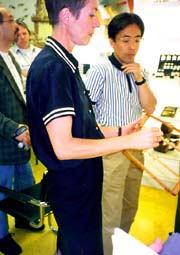 Next, Ms. Geugelin showed me cosmetic products made from honey, and other bee products.
Next, Ms. Geugelin showed me cosmetic products made from honey, and other bee products.
"For cosmetic products containing royal jelly, we do the production and sales in a business tie-up with a pharmaceutical company. No preservatives are added to the products, so we must always keep making new cosmetic products in small portions."
The next product she showed me was propolis.
"This is made from propolis and tea tree oil. One can eat it or put it in the bath. When it is used in the bath, it is especially effective for dry skin."
The Yamada Bee Farm also produces royal jelly essence lotion. In Japan, manufacturing and sales of cosmetic products are strictly regulated by the government. I asked her about the situation in Germany.
"The same is true, here, too. We're planning to reduce the production of cosmetic products. Regulations on cosmetics production and sales in Germany have been made so strict that only certain major cosmetics manufacturers can comply with them."
The modern or Western medical principle is that patients should be treated after they become ill. However, in the Orient, there has long been a tradition that people should eat appropriate food that prevents illness. Chinese herbal medicines are the product of these two principles, which is situated just between the Western and Eastern concepts of health. I believe propolis, royal jelly and bee pollen are products that contribute to people's health. I told her this and she answered:
"Apiculture is closely connected with nature. We are conducting marketing based on the idea that the connection between human life and nature is very important. Life is short and money doesn't mean everything."
I couldn't agree more. I think apiculture is something that cannot be done without having a philosophical and social mission. I told her about my opinion.
"I think mankind has lived with the belief that science and technology are omnipotent, and that we have made big mistakes in living with nature. In order to change this situation, I think it's necessary for us to go back to the old way of living with nature. Agriculture and apiculture are some of the symbolic examples of our return to nature."
"It's a great pleasure for us to hear that our customers' health conditions improved after they bought our honey. Eating the right foods and natural products is very important for everyone to stay healthy."
One single bee, which cannot do so much work by itself, can do a great job by working in community with other bees. It would be rather true to say that one bee is not one life, but that the community made up of many bees is one life. I think this theory holds true to human health. True health can be gained and maintained only when the mind as well as the body are in sound condition. My visit to the Geugelin Bee Farm provided me with a very precious experience, which made me renew my policy for the maintenance of good health.
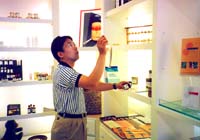
|




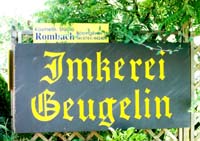 The day after I visited Prof. Vorwohl, I went to the old city of Freiburg, which is impressive because of its clear water and beautiful dome. I visited the Geugelin Bee Farm, which has three generations of history.
The day after I visited Prof. Vorwohl, I went to the old city of Freiburg, which is impressive because of its clear water and beautiful dome. I visited the Geugelin Bee Farm, which has three generations of history.
 Next, Ms. Geugelin showed me cosmetic products made from honey, and other bee products.
Next, Ms. Geugelin showed me cosmetic products made from honey, and other bee products.
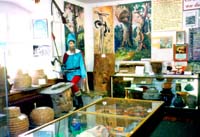 After visiting the Geugelin Bee Farm, I left for Erlangen to visit the "Munstertal Apiculture Museum." This museum has a private collection of the 80-year-old "Pope of Apiculture," Mr. Karl Pfefferle.
After visiting the Geugelin Bee Farm, I left for Erlangen to visit the "Munstertal Apiculture Museum." This museum has a private collection of the 80-year-old "Pope of Apiculture," Mr. Karl Pfefferle.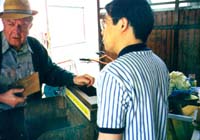 He showed me a "trick beehive" that bees can go in and out of even if the door to the box is closed. He also showed me a "light beehive" that women can easily carry. His gentle and humorous character is manifested in all of these inventions. His inventions, as well as the exhibits of the museum, are examples of "apiculture as a culture," and they are quite different from the beekeeping regulated by rigid laws and standards. Having seen these aspects of apiculture in Germany, I came to realize again the versatility and profoundness of German apiculture.
He showed me a "trick beehive" that bees can go in and out of even if the door to the box is closed. He also showed me a "light beehive" that women can easily carry. His gentle and humorous character is manifested in all of these inventions. His inventions, as well as the exhibits of the museum, are examples of "apiculture as a culture," and they are quite different from the beekeeping regulated by rigid laws and standards. Having seen these aspects of apiculture in Germany, I came to realize again the versatility and profoundness of German apiculture.